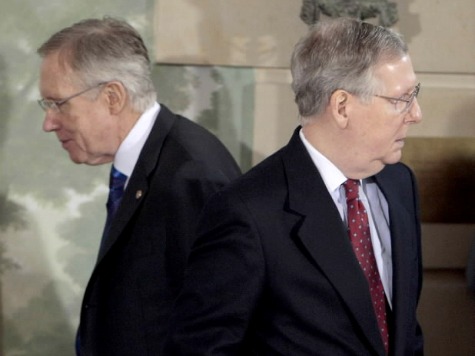
Yesterday, the Senate approved changes in its rules relating to ending a filibuster. The rule change has been a top priority of outside progressive groups, who believe the rule blocks enactment of their agenda. In recent weeks, Majority Leader Reid had increasingly threatened to eliminate the filibuster altogether, through the so-called “nuclear option.” Yesterday’s agreement provides a mechanism to eliminate the filibuster on bringing legislation to the floor, but keeps it in place for final passage of a bill.
The new rule creates a procedure where the Majority Leader can ask the Chair to bring a particular piece of legislation to the floor. Approving this requires just a simple majority vote. After a period of a few hours, the legislation would be brought to the floor for amendments. The majority and minority would each get at least two amendments to offer on the bill.
One Senior GOP aide in the Senate said the amendment provision create a “special class of super Senators, Reid and McConnell, who would control the offering of amendments. Reid and McConnell will have privileges other Senators do not.”
Another Senior GOP aide, however, disagrees with that. “Currently, only Sen. Reid controls which amendments are offered for consideration.” The filibuster deal will ensure, potentially, that at least some GOP amendments to bills are considering. Sen. McConnell would not select which amendments are offered, but would work with the entire caucus to make that decision.
However one interprets the changes, they are a loss for conservatives. The Majority Leader has been afforded a great deal more power in the change. The Leader now has the power to bring any piece of legislation to the floor, provided the minority agrees to a package of amendments to be offered on the bill. If the minority does not agree to a package of amendments, sources tell Breitbart News, it preserves the right to filibuster the move to take up the legislation.
The greater loss, however, is one of precedent. The left has transformed much of our policy through small, incremental steps. They demand 100%, get half of what they want and prepare for the next fight. That they only got 50% of what they want or are even angry that they didn’t get everything is no cause for celebration. At this specific moment, the House acts as a check on the Senate, making the filibuster less important for conservatives to block bad legislation. Eliminating the filibuster now wouldn’t usher in a wave of new progressive laws, since the House would kill these bills. The move now is more about eroding the procedure in the future.
The deal also preserves the filibuster for Supreme Court, Circuit Court and Cabinet nominations. It eliminates it, however, for district court judges and lesser political offices. Once it has been established that some nominations shouldn’t be filibustered, it isn’t hard to imagine this practice spreading to other, more significant positions.
Sources have told Breitbart News that talks to avert Reid’s “nuclear option” took on new urgency yesterday when statements by Sen. Ben Cardin convinced GOP Senators the Reid had the 51 votes he needed to eliminate the filibuster. There is some question, though, whether Reid could pull off his gambit. The Courts have ruled that the Senate can change its rules by a simple majority vote, but the proposal to change the rule could be filibustered, by an even more stringent 67 vote threshold.
In the end, the filibuster to pass legislation was preserved, for now. But, it is weaker than it was at the start of the week. If Reid had tried to push through his “nuclear option” it would have sparked political chaos. The Senate likely would have been ground to a halt as parties considered a legal challenge to the move. Every now and then, though, a little chaos isn’t necessarily a bad thing.

COMMENTS
Please let us know if you're having issues with commenting.